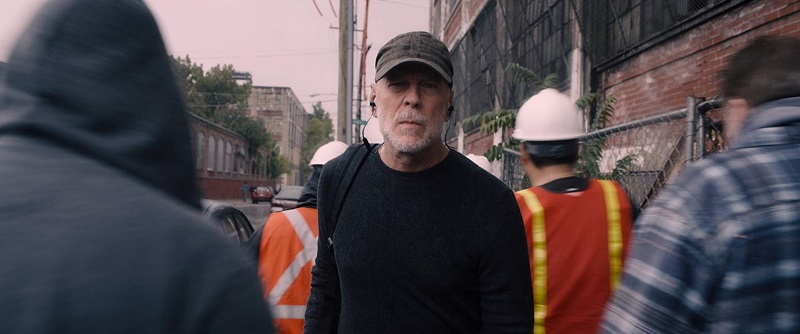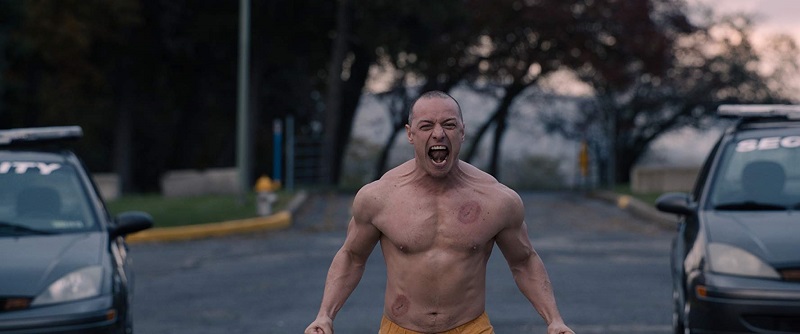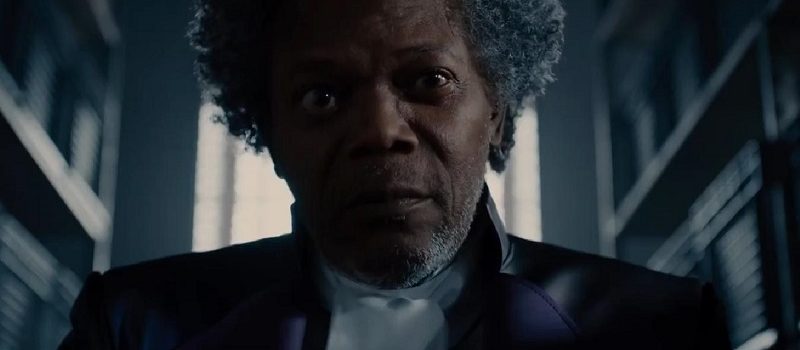At the conclusion of Split, M. Night Shyamalan stunningly pulled his greatest twist yet. Turns out that the film, that featured a James McAvoy hurricane performance, was actually the second act in a three-act play… one that dated back to Unbreakable! The third act, Glass, arrives in theaters January 18. Anticipation could not be higher to witness where the filmmaker would thread his thrilling tapestry almost two decades in the making.

McAvoy further expands a brilliant characterization. In Glass, he serves up a lesson for thespians everywhere in the art of character crafting. It is mesmerizing watching him embody all that lies in the mind of Kevin Wendall Crumb with his dozens of personalities that can change on a dime.
It is a performance alone that should get audiences in the theater.
What’s so fascinating is Shyamalan has crafted a foible that is nothing it seems… or appears to be. You’re thinking, “sure, tell me something I don’t know about M. Night.” It is not necessarily specific plot points I’m speaking to in this realm. See, this film has been advertised as Glass, aka what Samuel L. Jackson’s character likes to call himself. Now, Elijah Price—his God given name—is in an insane asylum, locked up and heavily sedated since we last saw him years ago. Be very clear heading in, this is not Price’s headlining tale… it is still firmly a McAvoy movie. That is a good thing. It just seems that many will expect the thrills and plot movement to be driven by the title character. It is not… not even close.
Knowing now that Unbreakable and Split are a congruent universe, there are certain boxes that are expected to be ticked in a third edition. Because history has told us as such, a comic book trilogy usually finds its final chapter truly being that… final. It is last go-around for these characters and the landscape they inhabit. Glass is not that movie. For most of the ride, it feels more like a Split 2 than Unbreakable 3. It becomes what it is destined to be in a third act after it stumbles through an expansive and overly wrought second act.
The other thing that must be stated is that if Glass is something that has been stirring in Shyamalan’s head for almost 20 years, perhaps even longer, it may feel out of place amongst the comic book movies that proliferate our cinemas each month. The movie-verse in 2019 is in a different place than it was in 2000. What the filmmaker goes after in his later writing and directing effort may feel slightly off being compared to the Avengers and Deadpools where most of their narrative winds up wrapped up in a little bow at the most and at the least, opens itself up to a follow-up.
With Unbreakable, Split and Glass, Shyamalan has created a three-part narrative that was never concretely grounded in the comic book movie world that we all know and love. As such, what he parcels to his audience in Glass should always be seen as a morsel to be ingested for what it could be, not for what it is. Many will be disappointed by this, given how high expectations are for the film after the enormous success of Split. A legion of comic book movie fans are programmed to expect something that lies within the storytelling traditions of comic book movies of the last decade. Yeah, that’s not going to happen with Shyamalan’s latest.
Also it must be noted that anticipation for witnessing the return of those Unbreakable characters could be underwhelming. That is no one’s fault. It’s just that anyone sharing cinematic space with McAvoy is going to come across as practically stiff. That is particularly true if they are tackling the role of protagonist to McAvoy’s infinitely-faceted antagonist. For example, Bruce Willis returns as David Dunn, and so too is his son from Unbreakable, Joseph Dunn (Spencer Treat Clark). The Dunn boys have teamed up and embraced Dad’s gift for being “super” and rescuing those in harm’s way across the City of Brotherly Love for the last 18 years. With the arrival of The Beast and McAvoy’s internal trainful of train wrecks, Dunn’s The Overseer (as he has been called) has his first true challenge since he “discovered” is super self (something we knew from that priceless glance from him at the final moments in Split).
The monster of Philadelphia and the Overseer are on a collision course.
In what can be described as a curve ball that no one who had seen Unbreakable or Split could have known was coming, there is a third who has a say in how all this superhero showdown will play out.

Shyamalan introduces Sarah Paulson’s Dr. Ellie Staple. As seen in the Glass trailer, our trio of super-humans land in a therapy program designed for “psychological disorders” like theirs. According to this plot turn, these are not superheroes. These are three men who have a mental predisposition to believe they are superheroes. It will be this scientific explanation versus comic book mysticism that is going to be the toughest pill to swallow for some viewers. Explaining away super-powers with psychological gibberish is an interesting narrative choice by the filmmaker and one that could take away a bit of the shine built up by the last two films.
A true artist is nothing if not one who sticks to his or her convictions through to the end. To a fault, Shyamalan has done that exact thing with every single of his films. It worked out for him in major ways and has failed him in equally as major ways over the years. This is a case where I am on board with his plot choices that thrilled completely in the first third and the final third of his latest artistic endeavor.
The issue with the second act is that it could have been fixed with a bit of tightening. But, with a storyline that was in one’s head for decades, killing one’s darlings on this epic tale of this scale may have been the filmmaker’s greatest obstacle in his career. It was one fence that he swung mightily for and missed profusely over the course of that middle section.
It meandered, but it also found its mojo just as our interest commenced to wane. By that point, we were firmly on that psychological cinematic cruise ship to Shyamalan-land through that third act that has us, honestly, ready for more.
Grade: B

